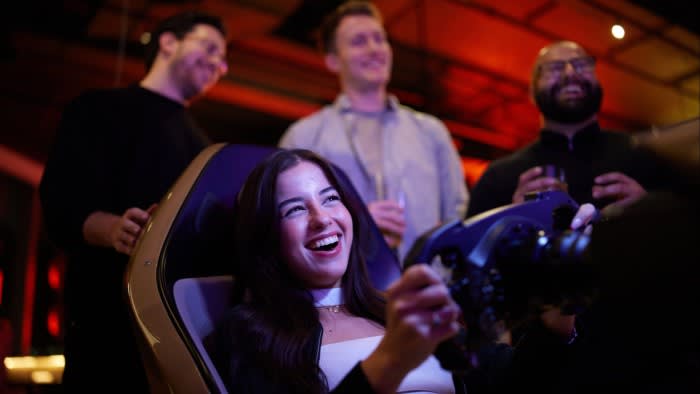Unlock the Editor’s Digest for free
Roula Khalaf, Editor of the FT, selects her favourite stories in this weekly newsletter.
Formula One has always revelled in being a travelling circus. But, when the global racing series leaves town, its American owners want to ensure that it is not out of sight and out of mind.
F1 Arcade, a racing simulator experience that combines a day or night out with gaming, is implementing expansion plans, particularly in the US, as the sport tries to get closer to fans, reach new demographics, and stay in touch throughout the year.
Adam Breeden, chief executive and founder, says F1 Arcade caters to young people who “want experiences” and “don’t just want to eat and drink”. Breeden has a long history in “experiential hospitality”, having previously co-founded ping pong bar chain Bounce, and darts-themed Flight Club.
The difference, this time, is that his latest venture bears one of the most famous brand names in sport.
“With the F1 brand above our door, there’s an inherent trust that comes with it, but also a higher burden of responsibility to deliver on quality,” Breeden says.
“It allows us to offer a champagne cocktail rather than just a normal burger. We could easily do this without the F1 brand . . . but I probably underestimated the power of the brand.”
F1 Arcade is the latest part of a strategy by the sport’s commercial rights owner to get closer to its audience. Liberty Media chief Greg Maffei has made clear that the group wants to strengthen its ties with F1 fans — another step in a plan that took off with Netflix’s Drive to Survive, a dramatic documentary series that is widely credited with boosting the sport’s popularity.
That helps to explain why Liberty is investing in F1 TV, a media service that goes direct to viewers. More recently, Liberty decided to run the Las Vegas Grand Prix itself, instead of the traditional model of outsourcing the event to another promoter.
“One of the historical challenges for the business, I would argue, was [that it was an] amazing spectacle but, when the circus came to town, [F1] didn’t know who attended, didn’t know why they attended, didn’t know what their real preferences were, or what they wanted,” Maffei told the FT earlier this year.
Liberty Media and F1 led a £30mn fundraising in F1 Arcade last year that also won support from McLaren Racing’s chief Zak Brown and its driver, Lando Norris.
These themed restaurant, bar and gaming venues are an example of how Formula One’s owner is able to license the motorsport’s brand to bring in new revenue streams.
The flagship site, close to St Paul’s Cathedral in London, opened ahead of Christmas 2022. Now, F1 Arcade, which has already expanded to Birmingham in the UK and Boston in the US, plans to add venues in Washington DC and Las Vegas, and have more than 30 destinations open by the end of 2027.
The business is attempting to leverage the unprecedented popularity of the sport in the US, with hundreds of thousands of fans showing up to races in Texas, Miami and Las Vegas. The company is already holding “watch parties”: screening Grands Prix live for US fans. Corporate events are another target.
Jon Gardner, US president of F1 Arcade, says customers there spend more and have different habits to those in the UK, requiring another approach.
“In the UK, everyone is focused on the race — there’s not as many drinks.” Gardner says. “The bar is full the entire time in the US [and] they’re still engaging with the Sims throughout the race.”
Even so, the company is competing for customers at a time when many are being more discerning about how they spend the pounds and dollars in their pockets. Breeden acknowledges the challenge but believes that focusing on quality will ensure customer loyalty.
“We’re planning to roll out F1 Arcade locations strategically, balancing speed and cost of capital. The US market is extraordinary, with huge potential for growth,” he says.
The company is also developing its “virtual currency and loyalty programme”, he adds, “creating a frictionless experience for guests and gathering valuable data on their preferences”.
Liberty Media’s growth could open up more opportunities for F1 Arcade. The US group announced in April that it had agreed to buy MotoGP, the elite motorcycle racing series, pending regulatory approval. So might the business bring MotoGP to the F1 Arcade?
“You’d have to have motorcycle simulators, but the playbook’s ready to go to do a different kind of simulator concept,” says Breeden. “It’s not out of the question; we need to look at it more deeply.”


